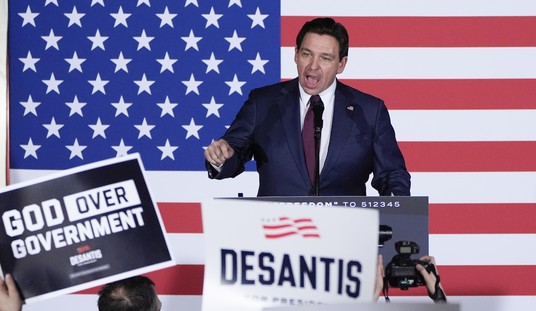Not that conservatives need any more reason to be despondent over the unwillingness of Congress to get our fiscal house in order, but yesterday brought out some pretty depressing news in the Senate. From my inaugural post at Big Government, co-authored with policy consultant and blogger Nick Brown:
A number of Members of Congress are fighting to prevent all sequestration cuts to the Defense Department from being enacted. This is not being done because they believe it will endanger national security – though that is certainly a defensible argument many others in the House and Senate are making. Rather they believe it will cause economic harm. To be fair, many Senate and House Republicans have supported or voted for legislation to replace the defense cuts with cuts from the rest of the budget, but while that shores up the national security argument it undercuts the economic argument.
Senators not only voted to continue full funding of food stamps next year, despite an amendment by Senator Rand Paul (R-KY) to cut $37 billion from the program and shift nutrition program responsibility to states, but did so in a bipartisan fashion with 13 Republicans joining Democrats in opposing the amendment. Sugar farmers will also continue to receive significant subsidies, with the support of 15 Republican Senators.
Senators Max Baucus (D-MT) and Orrin Hatch (R-UT) are leading the Senate Finance Committee to attempt to pass a tax package before year’s end. However, this is not just any tax package. From the article:
The tax package is a fraction of the cost of the Bush tax cuts, but this list of tax credits — which deal with everything from alternative energy to mass transit — is a top priority for the business community, as well as special interests on K Street.
The House is also in rough shape when it comes to cutting spending:
Also on Thursday morning, Red State’s Erick Erickson posted about a Club for Growth “Spending Cut Scorecard” for House Members. Erickson gave the following depressing news:
- Only 20 members of the House have voted for every amendment to cut spending. All are Republicans.
- 50 members of the House have voted against every amendment to cut spending. 49 are Democrats. One is a Republican (Bonner).
- The average Republican voted for spending cuts 59% of the time. (Republican Freshman are only slightly better at 60%.)
- The average Democrat voted for spending cuts 6% of the time.
- The nine Republicans, including four freshmen, who have least often voted to cut spending are: Bonner 0%, Meehan 4%, LaTourette 4%, Bass 4%, Simpson 4%, Lucas 4%, King, P. 4%, Grimm 4%, and Dold 4%.
- The eight Democrats who have most often voted to cut spending are: Matheson 32%, Rush 31%, Kucinich 30%, Polis 28%, Cooper 20%, McIntyre 17%, Velazquez 17%, and Honda 17%.
The fact of the matter is that spending needs to be cut and the tax code needs to be reformed, and soon. Not ten years from now, not five years from now. This year or next year, lest we hit the fiscal cliff Nick and I talk about in the piece. Yet many Members of Congress are unwilling to do either in case it loses them the next election. Which begs the following questions:
- First, are older Americans willing to forgo part of their hard-earned retirement benefits in order to begin the process of bringing the budget back into balance?
- Second, are younger Americans willing to pay taxes for retirement benefits they won’t receive, in order to phase in reforms?
- Third, will Republicans admit the Defense Department should do less and should spend tax dollars more responsibly with what it does fund?
- Fourth and most importantly, will Democrats admit that even if we cut defense spending to zero starting today, we’ll be essentially bankrupt as a nation in the next two decades as social spending (including entitlements) takes up a growing share of the federal budget? (I won’t go so far as to ask if Democrats will ever admit most, if not all, social spending shouldn’t be funded by federal tax dollars in the first place.)
- And fifth, will taxpayers vote in politicians who will consistently and purposefully ignore special interests in order to create a flatter, loophole-diminished tax code, to create greater economic efficiency and bring in more tax dollars (which should go straight to deficit reduction) to the federal government through economic growth instead of higher taxes?
Washington Post columnist George Will recently decried the way “bipartisanship” is often put on a pedestal, and picked out a few egregious examples of how bipartisanship has made things worse in America. Yesterday was a prime example of how the wonders of bipartisanship can also fail to find solutions. Nick and I offer our blunt, if despondent, take on the situation in our closing, and basically call out the American people to make the changes we all know need to happen:
This year America is going to run its fourth straight trillion-dollar deficit, and Baby Boomers are going to keep retiring at a rate of 10,000 people per day for roughly the next 18 years. If Congress cannot even cut 2.85% from this year’s expected deficit – which is about what Senator Paul’s amendment would have resulted in saving – or stop themselves from using the tax code to get re-elected, how can we trust members of this body? How can the citizenry be assured that the federal government is safeguarding middle-aged people from losing their retirements? Or that it will prevent the Debt-Paying Generation from paying enormously high taxes and bearing the burden of retired Baby Boomers in Greekesque brink-of-collapse fashion while unemployed at unthinkable rates and required to work long past the current retirement age? The short answer is, “We can’t,” and the longer answer is, “We can’t, and our nation is going to suffer greatly for it.”








Join the conversation as a VIP Member